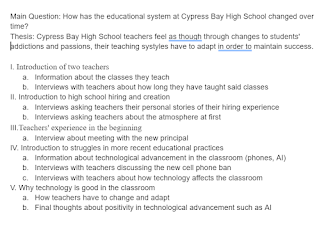Critical Reflection for "The Evolution of Cypress Bay"
- How did research inform your product and the way it uses or challenges conventions?
- How does your product engage with audiences?
- How does your product represent social groups/issues?
The documentary "The Evolution of Cypress Bay" focuses on a school that has changed heavily over the last 20 years. This includes themes of how technology has affected the classroom and how teachers must adapt to changes made in the educational system.
When this documentary began, research played a vital role in the way this documentary was created and structured. By doing initial research with class documentaries, it was much easier to find meaning and create meaning in documentaries created by implementing lessons learned. In understanding key concepts of a documentary and seeing how for example American Promise (a documentary you can see more about
here) created strong meaning in a school setting, this documentary was initiated with lots of inspiration henceforth making it more defined from the start. By watching many documentaries there were invaluable insights gained into the power of storytelling. This was shown in the importance of crafting a narrative, selecting visually pleasing shots, and conducting interesting and engaging interviews.
Initially creating this documentary began with research on particular conventions such as the ways in which this story was going to be told as well as the lens viewers should look through. One large debate that took place was whether or not younger teachers or students should've been involved in interviews. As you can see in the Pre-Production Blog
Here this documentary featured only two interviews from two teachers who have been at Cypress Bay since its opening. While many arguments were raised of how having more interviews with possibly younger and more modern students/teachers could've elevated the piece ultimately the conclusion was that due to the want to showcase an evolution, using older teachers throughout the piece showed how they feel it has changed. By highlighting their experiences, we aimed to capture the essence of the school's transformation over time. This approach allowed us to delve into the challenges and triumphs that have shaped Cypress Bay. If I were to do this piece again however I could see how using younger individuals could've been a nice addition, especially in the technological segment of the documentary.
Research was integral in understanding how to conduct a documentary-style interview so that the interview style matched the way this documentary was being shown to the audience. For example, in understanding genre conventions, the decision was made to use indirect interviews rather than direct ones so the audience could hear the interviewee's perspective rather than the interviewer's questions. The choice of indirect interviews, rather than direct ones, allowed the documentary to have a more intimate and engaging viewing experience. By minimizing the presence of the interviewer, we shifted the focus to the voices of the teachers and their personal stories.
In addition to having well throughout and established research having a defined audience was also very important. This documentary's target audience is students or teachers who have either personally been affected by the change in the school system or have seen this change firsthand. Due to this target audience, b-roll was very important to facilitate the audience to feel a certain way throughout the piece. In having lots of footage within classrooms, the audience can see it firsthand and even relate to the way students do their work nowadays. The selection of B-roll footage showcased the school's physical transformation and student life, which in return added depth and context to the narrative. One thing I didn't include which I think could've related and made the target audience more engaged was music. I think adding music under certain segments of the doc could've pushed the content along in a smoother way.
I also feel that indirect interviews can help the audience stay engaged for longer when the interviewee speaks in bite-sized chunks, and the content has the potential to flow nicely. Within the structure of the piece by utilizing indirect interviews the viewer can understand
Technically speaking I feel as though this piece did not turn out exactly as I wanted, it felt like a lot of different concepts trying to be merged into one which at times does not translate correctly. However I think that the point does come across I just wish that this piece could've either been more focused on the change of Cypress Bay or how technology affects classrooms (this one would've definitely been stronger).
The main social issue that is explored throughout this documentary are issues within our school system, such as technological advancements, and the changing demands of a high school teacher. By highlighting the experiences of teachers who have been at this school for over 20 years it also shows the dedication of teachers and the ways in which they have to evolve with changes made to our school system like the recent ban of technology (non-educational).
Furthermore, the film touches upon the challenges and opportunities presented by technological advancements in education. It explores how technology has transformed teaching methods, student learning, and communication within the school. This was shown through visual and auditory elements that bring the piece together.









